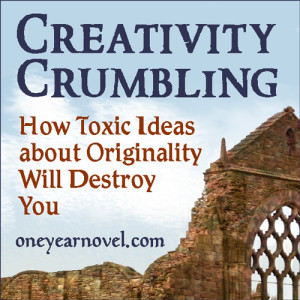Creativity Crumbling: How Toxic Ideas about Originality Will Destroy You
Creativity Crumbling
You hear many dangerous things as a writer. Perhaps you hear, “Your prose is rhyming, but in the bad kind of way.” Maybe it’s, “Your characters seem like robots.” Or a simple, “This is boring.” Tough criticism should be expected, but in the ocean of comments toeing the line of becoming insults, there is one dangerous judgment a writer can’t brush away. It sticks.
“Your story doesn’t seem original.”
Gut punch. You feel the impact immediately, but it is a slow kind of pain that builds with time. It is a pain you can’t ignore because it attacks the core of your body, your art, your novel. Once the punch is delivered, it changes the way you act and think. Your future works are damaged by the sickening thought, “Perhaps I can’t actually create. Perhaps these things aren’t worth the time.”
Before you label yourself as a worthless thief, stop and think about why you were punched. Stop and breathe. Where do ideas really come from? A spiral of stolen concepts, copied techniques, and unconscious influences trails behind every single work of art. The spiral behind your own work isn’t as poisonous as you might think. Don’t let that punch crumble you.
The Place Where Ideas Come From
We, as humans, cannot create.
In plain language, it’s a shock to read, but it’s the truth. Ideas are born of two main elements. The first is influence. Take a popular story and trace its influences back in time, and you’ll find that it is not a new thing, but a brilliant mix of other works. In its purest form, creation is the act of bringing something new into existence—as only God does. Humans are excellent patchwork artists, but that is where our abilities end. There is no art without influence, and even with influence, there’s one missing factor that changes the way we build stories.
Necessity is the second main element. Alexander Graham Bell was not the only inventor of the telephone. Elisha Gray had the same idea, but Mr. Gray arrived at the patent office a few hours later than Bell. Why did both men make the same thing at the same time? It’s simple. The need for a fast communication device weighed on each inventor until they found a solution. Necessity is an unexpected—and often overlooked —factor in the making of art, but without it, nothing would work the same.
The nature of ideas is a complicated topic, but the truths we draw from it have healing power. Patchwork art is not a bad thing because it yields beautiful ideas in the only way humanly possible. It still yields. And sometimes results are produced from necessity, so when you look at your story and wonder if it is worth your time, just know that it exists for a reason, even if that reason isn’t clear.
But when the bruise still aches, how do we see clearly?
Comparison, Doubt, and Worth
Many people fall into the comparison trap. It’s a whirlpool that throws you in circles, pulls you under the sea, and ends the art you’ve started. When someone tells you they’ve heard your idea before, the immediate human reaction is to hunt down the similarities and kill them. This is partly because no one wants to feel guilty of theft, but the major reason is that uniqueness is a measure of self worth. You want to feel needed. A critique questioning your originality causes you to doubt your usefulness.
Two things: One, you can’t stop nasty critics. Two, you can accept the patchwork nature of human work and use it to its max.
Stories exist to affect us, and I am one hundred percent certain the story you are creating right now is affecting you. Perhaps it is helping you think about a cultural issue from a different perspective. Perhaps it is helping you reassure yourself of a truth you already know. Perhaps it is simply helping you learn to write better stories. Whatever the reason, your patchwork piece of art is not a ripoff if it changes you in the way you need to change.
Creativity Rising
The problem of originality reaches far beyond being punched in the gut with a sharp critique. It goes beyond accepting the fact that ideas are hybrid creatures born of other ideas. It even flies past learning how to survive in the comparison whirlpool. Originality is all about meaning, depth, and purpose.
“Your story doesn’t seem original.”
That punch will always hurt, but you are the one who chooses to give it destroying power. We were all given the gift of art, the gift of patchwork, and the gift of meaning. We may not be able to create something out of nothing, but we don’t need that ability. The way we stitch our art doesn’t matter as much as the picture it becomes.
…
What elements have influenced your stories? How have your own stories affected you?
…
About Sam
Sam is an abstract thinker who likes writing odd books as much as he likes playing music too loud. He likes to be overwhelmed by the world and all of its wondrous things, but some days he just wants to walk down a quiet path and hear nothing but wind.





Wow! Thank you SO much for writing this. I’ve been feeling that “gut-punch” a lot myself in recent months. With my current in-work novel drawing influence from Star Wars, Star Trek, Halo, and BattleStar Galactica (the old ones), it seems like there is always a point when I bang my head against my desk because it just seems TOO familiar. I think that as writer’s we each want to bring something new and original to the table, but a lot of us, especially those first starting out, have a flawed idea of what “originality” really is. In reality, the only “original” creation was when God created the heavens and Earth (Genesis 1:1). When you look at it like that, even the very act of CREATING isn’t original! Our modern concept of “Originality” is in reality simply using the same ingredients and elements that have been used in the past, but combining them in a different manner. Like John Piper said: “Don’t be surprised. There is nothing new under the sun. Only endless repackagings”
Thanks for you post and God Bless!
How many times have I started writing something, when I get the toxic thought syndrome. Thanks for sharing your great advice.
Debby
I have struggled with originality for awhile, thinking that my story had to be completely different. now I can start fresh, working on the fabric of my book, creating the quilt of a lifetime.